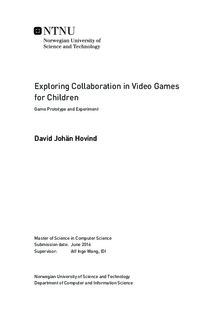| dc.description.abstract | Children today, are exposed to video games from an early age in the form of tablets, smart phones and computers. Social interaction is a big part of why we play video games and is a way for us to socialize with friends and strangers. This thesis seeks to explore these areas by creating a video game, focusing on social interaction to stimulate collaboration children.
The main research goals of this thesis was to create a game prototype that focuses on social interaction and collaboration, conduct an experiment by testing the game with children, and to study the technologies and process involved in video game development. Reaching these goals was achieved through a literature study on video game technologies and concepts, the design and creation of a video game prototype, and by analysing the results from a play test that was performed at Buvik School.
From these methods, the central findings were that having different roles for the players in the game created a dependency between the players which enhanced the collaboration. Puzzle elements, and the unique gameplay elements in the game prototype, were a great way to encourage special interaction as the children needed to communicate in order to succeed in the game. The play testing was a success and all the children enjoyed playing a collaborative game with focus on social interaction. Additionally, the children saw the importance of working together in order to succeed. Furthermore, the process of video game development is greatly aided by tools like game engines that handle common video game related tasks.
Research presented in this thesis is useful for aspiring and qualified video game developers, as it explores video game technologies and concepts, and the process of video game development. The game prototype created, its design, and the results of the experiment serves as empirical data and a source of inspiration for research and video game development. The results show that using collaboration in video games has potential for further research, and could possibly be used to help teach children valuable skills with regards to social interaction and collaboration. | |

